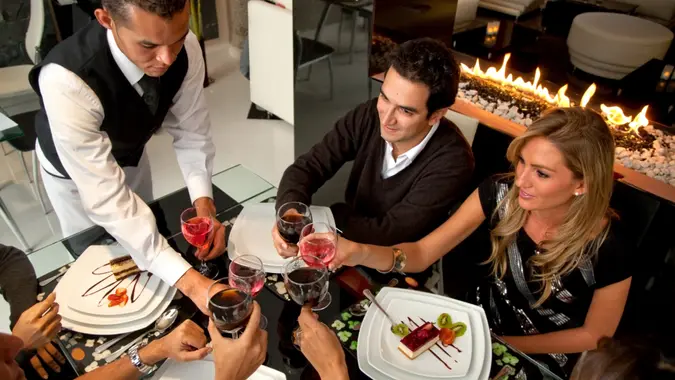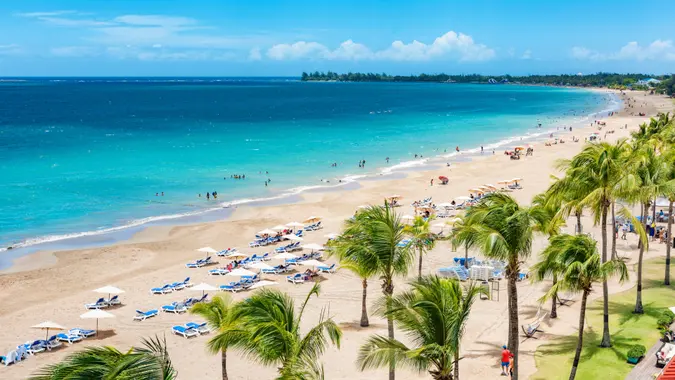4 Ways Tourists Are Overcharged — How To Avoid It on Your Next Vacation

Commitment to Our Readers
GOBankingRates' editorial team is committed to bringing you unbiased reviews and information. We use data-driven methodologies to evaluate financial products and services - our reviews and ratings are not influenced by advertisers. You can read more about our editorial guidelines and our products and services review methodology.

20 Years
Helping You Live Richer

Reviewed
by Experts

Trusted by
Millions of Readers
Between plane tickets, hotels and attractions, traveling is already expensive. If you’re not careful, you could be overcharged on your next vacation. In some cases, it’s just locals making the most of high-traffic areas, but in other scenarios, it might be more devious. If you’re traveling soon, you’ll want to keep your eyes out for the below tourist traps that could make your trip budget skyrocket.
Also here are ChatGPT’s top travel hacks of the year.
Tourist Pricing at Restaurants
If you’re traveling to a tourist-heavy area on your trip, it’s safe to say that you’ll likely be overcharged for food. If the restaurant is central to the sights you want to see or the food is fantastic, you might not mind a slightly higher price.
Some restaurants geared towards tourists can feel more like a trap than a treat. For example, there’s a notorious restaurant in Mykonos, Greece, called DK Oysters, where multiple travelers have reported being stuck with astronomical bills for subpar food. One couple shared their experience with social media after paying an $860 bill for 4 crab legs, a Greek salad and two mojitos, per a NY Post story. At the same restaurant, a honeymooning couple from Toronto, Canada, was startled when the check for a beer, an aperol spritz and 12 oysters totaled out to $567.
The customer experiences shared online for this restaurant had a few red flags in common that you’ll want to look for to avoid these tourist traps:
- There are employees outside, convincing you to come in
- The menu is in English, but you’re not in a predominantly English-speaking country
- You’re pressured into accepting food or drinks you didn’t order
- Prices aren’t prominently displayed
- Or prices are listed misleadingly (like small print saying “price per 100 grams”)
While this is a more outlandish instance of overcharging tourists, less absurd methods are often used to charge vacationers more. In some countries, it’s common to find tourist menus with a higher price than they would charge locals or food on the table that you assume is free, but is then added to your bill.
Overpriced Taxis
In global destinations like Istanbul and Bangkok, taxi overcharging is one of the most common tourist complaints. You may be forced to rely on taxis to traverse the city, but sometimes the drivers are up to no good. While rideshare apps tell you the price of your ride upfront, taxis operate on a different payment structure.
For example, in Thailand, metered taxis work on a fixed fare, which charges a base fee to get in, plus a fee per kilometer, according to ThailandAwaits.com. However, some taxis try to take advantage of tourists by offering a “no meter” fare, where you pay a fixed price to get to your destination. In some instances, when it’s a longer trip or you’re on a route known for traffic jams, it might make sense. But on short trips, you’re likely being overcharged.
Another common tactic taxi drivers may use is taking unnecessary detours to drive up the price or claiming that their meter doesn’t work. If you come across this trick in your travels, take these precautions:
- Be cautious of overly-friendly drivers who suggest a no-meter rate.
- If you notice the meter isn’t running, ask the driver to turn it on.
- Go to the official taxi stand to book a ride.
- Decide on a fair price with the driver before starting your ride.
- If the meter is broken, don’t get in.
- Use rideshare apps if available.
ATM Fees
Using ATMs abroad can significantly overcharge travelers via poor exchange rates, multiple hidden fees and conversion markups that can be a drain on your travel fund. When you withdraw cash via foreign ATMs, you may be hit with:
- A fixed flat fee (typically $1 to $5, sometimes up to $10 per withdrawal)
- A currency conversion percentage fee (1% to 3%) on the amount withdrawn
- A surcharge by the ATM operator itself (varies)
While you might not get hit with all of these fees at once, it is possible. The most expensive is often dynamic currency conversion (DCC). With this scheme, ATMs or currency exchanges embed a markup into the exchange rate, which can add as much as 18% or more and frequently, the more favorable rate is buried in fine print. Avoid these costly fees by taking these steps:
- If an ATM asks, “Would you like to complete in USD or GBP instead of local currency?” The answer should almost always be “no.” That’s Dynamic Currency Conversion in action.
- Withdraw cash before your trip and make strategic withdrawals from foreign ATMs.
- Use a reliable currency conversion app to determine if you’re getting the best rate.
‘Free’ Gifts
In many European destinations and other major travel hubs, someone may offer you a “free” gift. It could be a bracelet, artwork or a flower. The catch is, they expect you to give them money or a donation for their “gift” and they’re fairly adamant about it. If you give in to the pressure, you may end up spending money on a trinket that’s worth a few cents.
In situations like this, it’s safe to assume that nothing’s free. Don’t allow strangers to place anything in your hand or put jewelry on your wrist. If they attempt to give you something, tell them no and don’t engage with them further.
Remember To Keep These Tips in Mind
If you travel frequently, you might be used to getting nickel-and-dimed everywhere. From expensive ATMs, overpriced taxis and restaurant “service charges.” The fix? Keep your wits about you. If something feels off, it probably is. Use fee-free cards, ask for menus with prices, verify taxi rates before the ride and always pay in the local currency. Smart travelers don’t just budget; they protect their money.
 Written by
Written by  Edited by
Edited by 

























